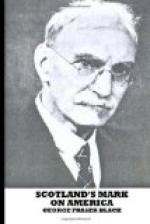Charles Pettigrew (1743-1807), Bishop of the Diocese of North Carolina, was of Scottish descent. James Kemp (1764-1827), second Bishop of Maryland, was born at Keithhall in Aberdeenshire. Charles Pettit McIlvaine (1799-1873), Bishop of Ohio (1832-73), author of “Evidences of Christianity,” 1832, was also of Scottish origin, from the MacIlvaines of Ayrshire. William Edward McLaren (1831-1905), third Bishop of Chicago, was grandson of a Scot. The first missionary Bishop of Duluth, James Dow Morrison (b. 1844), was son of Rev. John Morrison and his wife who emigrated from Glasgow in 1837. Abram Newkirk Littlejohn (1824-91), first Bishop of Long Island, was a descendant of Hugh Littlejohn of Perthshire. James Steptoe Johnston (b. 1843), second Bishop of western Texas, was of Scottish descent; and Hugh Miller Thompson (1830-1902), second Bishop of Mississippi, was an Ulster Scot, born in Londonderry.
Richard Gilmour (1824-91), second Roman Catholic Bishop of the Diocese of Cleveland (1872-91), born in Glasgow, Scotland, of Presbyterian parents, was noted for his zeal in behalf of Catholic education. Robert Seton (b. 1839), a descendent of the Setons of Winton, was created Archbishop of Heliopolis in 1903. Elizabeth Ann Bayley Seton (1774-1821), of the same family, was founder of the Roman Catholic Order of Sisters of Charity (1809), of which she was the first Mother Superior.
John McLean (1759-1823), merchant and philanthropist, was founder of McLean Asylum for Insane at Somerville, Massachusetts. Robert Rantoul (1778-1848), of Scottish parentage, worked hard to ameliorate the criminal legislation of the country, and took part in establishing a charity school at Beverly, Massachusetts, which was said to be the first Sunday School in America. Mrs. Graham, a Scotswoman, celebrated in New York city for her benevolence and charity, founded a Sunday School in New York for young women in 1792. The movement however languished for some years until her daughter, Mrs. Bethune, also born in Scotland, organized the Female Sabbath School Union of New York in 1816. By her work in this connection Mrs. Bethune earned her title of “Mother of Sabbath Schools in America.” Fanny Wright (1795-1852), Madame Frances D’Arusmont, born in Dundee, Scotland, lectured extensively in the United States on social, religious, and political questions, and was the author of “Views on Society and Manners in America,” etc. Robert Dale Owen (1801-77), born in Glasgow, social reformer, spiritualist, author, and Member of Congress from Indiana (1843-47), was a strong advocate of negro emancipation. James Miller McKim (1810-1874), of Ulster Scot descent, was one of the organizers of the National Anti-Slavery Society (1835), later publishing agent of the Pennsylvania Anti-Slavery Society, and in 1865 one of the founders of the New York “Nation.” Albert Brisbane (1809-90), of Scottish and English descent, was the “Father of American Fourierism.” Albert




